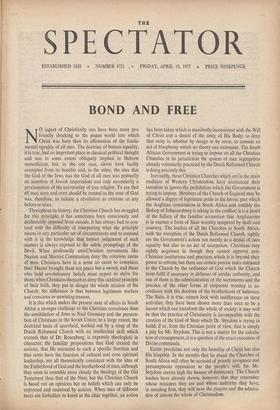BOND AND FREE
N0 aspect of Christianity can have been more pro- foundly shocking to the pagan world into which Christ was born than its affirmation of the funda- mental equality of all men. The doctrine of human equality, it is true, had an important place in classical political thought and was to some extent obliquely implied in Hebrew monotheism, but, in the one case, slaves were tacitly exempted from its benefits and, in the other, the idea that the God of the Jews was the God of all men was primarily an assertion of Jewish imperialism and only secondarily a proclamation of the universality of true religion. To say that all men were and even should be treated as the sons of God was, therefore, to initiate a revolution as extreme as any before or since.
Throughout its history, the Christian Church has struggled for this principle; it has sometimes been consciously and deliberately opposed from outside, it has always had to con- tend with the difficulty of interpreting what the principle means in any particular set of circumstances and to contend with it in the knowledge that human judgement of such matters is always exposed to the subtle promptings of the Devil. When professedly anti-Christian movements like Nazism and Marxist Communism deny the common status of men, Christians have in a sense no cause to complain; their Master brought them not peace but a sword, and those who hold revolutionary beliefs must expect to strive for them; when Christians themselves deny this cardinal principle of their faith, they put in danger the whole mission of the Church; the difference is that between legitimate warfare and conscious or unwitting treason.
It is this which makes the present state of affairs in South Africa a stronger challenge to the Christian conscience than the annihilation of Jews in Nazi Germany and the persecu- tion. of Christians in the Soviet Union; to a large extent, the doctrinal basis of apartheid, worked out by a wing of the Dutch Reformed Church with an intellectual skill which exceeds that of Dr. Rosenberg, is expressly theological in character; the familiar propositions that God created the nations, that He entrusted to each a specific function and that some have the function of cultural and even spiritual leadership, are all theoretically consistent with the idea of the Fatherhood of God and the brotherhood of man, although they seem to resemble more closely the theology of the Old Testament than that of the New; but the Christian Church is based not on opinions but on beliefs which can only be expressed and sustained by actions. When men of different races are forbidden to kneel at the altar together, an action
has been taken which is manifestly inconsistent with the Will of Christ and a denial of the unity of His Body; to deny that unity is, whether by design or by error, to commit an act of blasphemy which no theory can extenuate. The South African Government in trying to impose on all the Christian Churches in its jurisdiction the system of race segregation already voluntarily practised by the Dutch Reformed Church is doing precisely this.
Inevitably, those Christian Churches which are in the main tradition of Western Christendom have announced their intention to ignore the prohibition which the Government is trying to impose. Members of the Church of England may be allowed a degree of legitimate pride in the heroic part which the Anglican communion in South Africa and notably the Bishop of Johannesburg is taking in the conflict; it is a proof of the fallacy of the familiar accusation that Anglicanism is in essence a form of State worship tempered by sloth and courtesy. The leaders of all the Churches in South Africa, with the exception of the Dutch Reformed Church, rightly see the Government's action not merely as a denial of race equality but also as an act of usurpation. Christians may rightly acquiesce in though they cannot approve non- Christian institutions and practices which it is beyond their power to reform; but there are certain precise tasks entrusted to the Church by the ordinance of God which the Church must fulfil if necessary in defiance of secular authority, and one of them is the administration of the sacraments and the practice of the other forms of corporate worship in ac- cordance with the doctrine of the brotherhood of believers. The State, it is true, cannot look with indifference on these activities; they have been shown more than once to be a leaven which can transform the whole of society; it may well be that the practice of Christianity is incompatible with the creation of the kind of State which Dr. Strydom is trying to build; if so, from the Christian point of view, that is simply a pity for Mr. Strydom. This is not a matter for the calcula- tion of consequences, it is a question of the exact execution of Divine commands.
Easter proclaims not only the humility of Christ but also His kingship. In the months that lie ahead the Churches of South Africa will often be accused of priestly arrogance and presumptuous opposition to the people's will, for Mr. Strydom carries high the banner of democracy. The Church leaders have already shown, however, that they remember .whose ministers they are and whose authority they have; in standing firm, they will have the prayers and the admira- tion of almost the whole of Christendom.


































 Previous page
Previous page